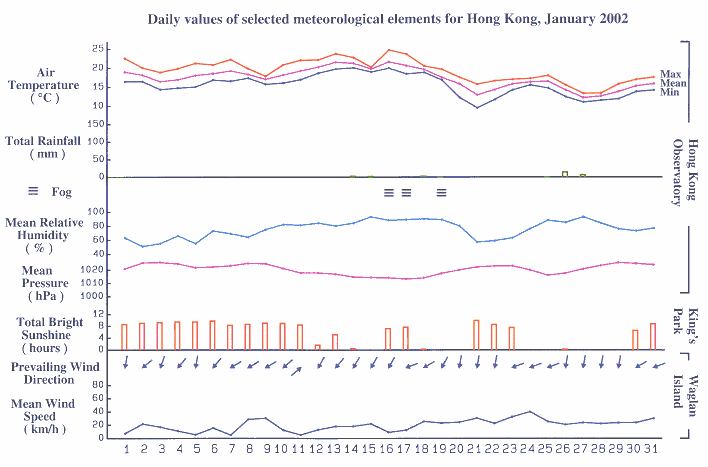The Weather of January 2002
|
January 2002 was warmer than normal. The mean temperature of 17.3 degrees and the mean minimum temperature of 15.5 degrees were both the eighth highest for January. The monthly total rainfall of 25.0 millimetres was 1.6 millimetres above normal. The fine spell at the end of 2001 carried over into the New Year. Under the influence of the winter monsoon, apart from cloudy periods on 12 January and some hazy interludes, fine and dry weather prevailed during the first thirteen days of the month. Hill fires occurred in Chuen Lung on 1 January and in Sheung Shui on 9 January, each destroying some 40 000 square metres of grassland and trees. The fine spell ended on 14 January as a maritime airstream brought warm and humid weather to the south China coastal areas. Mist and light rain patches affected Hong Kong for two days. Rain eased off on 16 January and there were fog patches in the harbour in the early morning. Sunny periods during the day brought the temperatures up to 24.7 degrees, the highest in the month. Fog affected many parts of the territory on 17 January. A 15000-tonne cruise ship and a 51-metre-long cargo vessel collided in Tathong Channel in low visibility. The captain of the cargo vessel was reported missing and two sailors were injured. Two ferries collided off Kennedy Town and two passengers suffered minor injuries. A surge of the northeast monsoon reached the territory in the afternoon bringing along some light rain patches. The weather remained misty and rainy on 18 and 19 January. With a replenishment of the northeast monsoon, it became cold on 20 January. Northerly winds strengthened offshore in the small hours of 21 January but subsided soon after daybreak. Under clear sky, temperatures dropped to 9.5 degrees, the lowest in the month. Fine, dry and sunny weather persisted for the next couple of days. Easterly winds freshened on 24 January and the weather became cloudy to overcast. Rain began to affect the territory on 25 January and became heavy at times on the following day. It remained cold for the next three days. The weather improved on 30 January with long sunny periods. It remained fine and sunny the next day. Only one tropical cyclone occurred over the South China Sea and the western North Pacific in the month. Details of the issuance and cancellation of various warnings and signals in the month are summarized in Tables 1.1-1.3. Monthly meteorological figures and departures from normal of January are tabulated in Table 2. |
Warnings and Signals issued in January 2002
Table 1.1 Strong Monsoon Signal
| Beginning Time | Ending Time | ||
|---|---|---|---|
| Day/Month | HKT | Day/Month | HKT |
| 20 / 1 | 2115 | 21 / 1 | 0930 |
Table 1.2 Fire Danger Warnings
| Colour | Beginning Time | Ending Time | ||
|---|---|---|---|---|
| Day/Month | HKT | Day/Month | HKT | |
| Yellow | 30 / 12 | 1800 | 1 / 1 | 1200 |
| Red | 1 / 1 | 1200 | 4 / 1 | 0600 |
| Yellow | 4 / 1 | 0600 | 5 / 1 | 0600 |
| Red | 5 / 1 | 0600 | 7 / 1 | 0600 |
| Yellow | 7 / 1 | 0600 | 9 / 1 | 0600 |
| Yellow | 21 / 1 | 0600 | 21 / 1 | 1130 |
| Red | 21 / 1 | 1130 | 23 / 1 | 0600 |
| Yellow | 23 / 1 | 0600 | 23 / 1 | 1800 |
Table 1.3 Cold Weather Warning
| Beginning Time | Ending Time | ||
|---|---|---|---|
| Day/Month | HKT | Day/Month | HKT |
| 20 / 1 | 1630 | 22 / 1 | 1630 |
| 26 / 1 | 1630 | 29 / 1 | 1630 |
Table 2 Figures and Departures from Normal - January 2002
| Meteorological Element | Figure of the Month | Departure from Normal |
|---|---|---|
| Mean Daily Maximum Air Temperature | 19.3 degrees C | 0.7 degree above normal |
| Mean Air Temperature | 17.3 degrees C | 1.5 degrees above normal |
| Mean Daily Minimum Air Temperature | 15.5 degrees C | 1.9 degrees above normal |
| Mean Dew Point Temperature | 12.7 degrees C | 2.5 degrees above normal |
| Mean Relative Humidity | 75 % | 4 % above normal |
| Mean Cloud Amount | 55 % | 3 % below normal |
| Total Rainfall | 25.0 mm | 1.6 mm above normal |
| Total Bright Sunshine Duration | 161.9 hours | 9.5 hours above normal |
| Mean Daily Global Solar Radiation | 10.11 Megajoule / square metre | 1.52 Megajoules below normal |
| Total Evaporation | 62.3 mm | 35.2 mm below normal |
| Remarks : | All measurements were made at the Hong Kong Observatory except sunshine, solar radiation and evaporation which were recorded at King's Park Meteorological Station. |
